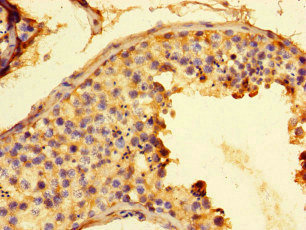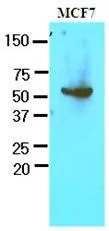![WB analysis of human G6PD (AA: 275-515) recombinant protein using GTX60518 G6PD antibody [2H7]. WB analysis of human G6PD (AA: 275-515) recombinant protein using GTX60518 G6PD antibody [2H7].](https://www.genetex.com/upload/website/prouct_img/normal/GTX60518/GTX60518_20170912_WB_1_w_23061123_143.webp)
WB analysis of human G6PD (AA: 275-515) recombinant protein using GTX60518 G6PD antibody [2H7].
G6PD antibody [2H7]
GTX60518
ApplicationsFlow Cytometry, Western Blot, ELISA, ImmunoHistoChemistry, ImmunoHistoChemistry Paraffin
Product group Antibodies
ReactivityHuman
TargetG6PD
Overview
- SupplierGeneTex
- Product NameG6PD antibody [2H7]
- Delivery Days Customer9
- Application Supplier NoteWB: 1/500 - 1/2000. IHC-P: 1/200 - 1/1000. FACS: 1/200 - 1/400. ELISA: 1/10000. *Optimal dilutions/concentrations should be determined by the researcher.Not tested in other applications.
- ApplicationsFlow Cytometry, Western Blot, ELISA, ImmunoHistoChemistry, ImmunoHistoChemistry Paraffin
- CertificationResearch Use Only
- ClonalityMonoclonal
- Clone ID2H7
- ConjugateUnconjugated
- Gene ID2539
- Target nameG6PD
- Target descriptionglucose-6-phosphate dehydrogenase
- Target synonymsCNSHA1, G6PD1, glucose-6-phosphate 1-dehydrogenase, epididymis secretory sperm binding protein
- HostMouse
- IsotypeIgG1
- Protein IDP11413
- Protein NameGlucose-6-phosphate 1-dehydrogenase
- Scientific DescriptionThis gene encodes glucose-6-phosphate dehydrogenase. This protein is a cytosolic enzyme encoded by a housekeeping X-linked gene whose main function is to produce NADPH, a key electron donor in the defense against oxidizing agents and in reductive biosynthetic reactions. G6PD is remarkable for its genetic diversity. Many variants of G6PD, mostly produced from missense mutations, have been described with wide ranging levels of enzyme activity and associated clinical symptoms. G6PD deficiency may cause neonatal jaundice, acute hemolysis, or severe chronic non-spherocytic hemolytic anemia. Two transcript variants encoding different isoforms have been found for this gene. [provided by RefSeq, Jul 2008]
- ReactivityHuman
- Storage Instruction-20°C or -80°C,2°C to 8°C
- UNSPSC12352203

![IHC-P analysis of breast cancer tissue using GTX60518 G6PD antibody [2H7]. IHC-P analysis of breast cancer tissue using GTX60518 G6PD antibody [2H7].](https://www.genetex.com/upload/website/prouct_img/normal/GTX60518/GTX60518_20170912_IHC-P_w_23061123_621.webp)
![IHC-P analysis of kidney cancer tissue using GTX60518 G6PD antibody [2H7]. IHC-P analysis of kidney cancer tissue using GTX60518 G6PD antibody [2H7].](https://www.genetex.com/upload/website/prouct_img/normal/GTX60518/GTX60518_20170912_IHC-P_1_w_23061123_136.webp)
![FACS analysis of Jurkat cells using GTX60518 G6PD antibody [2H7]. Green : G6PD Red : negative control FACS analysis of Jurkat cells using GTX60518 G6PD antibody [2H7]. Green : G6PD Red : negative control](https://www.genetex.com/upload/website/prouct_img/normal/GTX60518/GTX60518_20170912_FACS_w_23061123_416.webp)
![ELISA analysis of antigen using GTX60518 G6PD antibody [2H7].
Black : Control antigen 100ng
Purple : Antigen 10ng
Blue : Antigen 50ng
Red : Antigen 100ng ELISA analysis of antigen using GTX60518 G6PD antibody [2H7].
Black : Control antigen 100ng
Purple : Antigen 10ng
Blue : Antigen 50ng
Red : Antigen 100ng](https://www.genetex.com/upload/website/prouct_img/normal/GTX60518/GTX60518_20170912_ELISA_w_23061123_476.webp)
![WB analysis of HeLa (1), MCF-7 (2), Jurkat (3) and K562 (4) cell lysate using GTX60518 G6PD antibody [2H7]. WB analysis of HeLa (1), MCF-7 (2), Jurkat (3) and K562 (4) cell lysate using GTX60518 G6PD antibody [2H7].](https://www.genetex.com/upload/website/prouct_img/normal/GTX60518/GTX60518_20170912_WB_w_23061123_513.webp)




